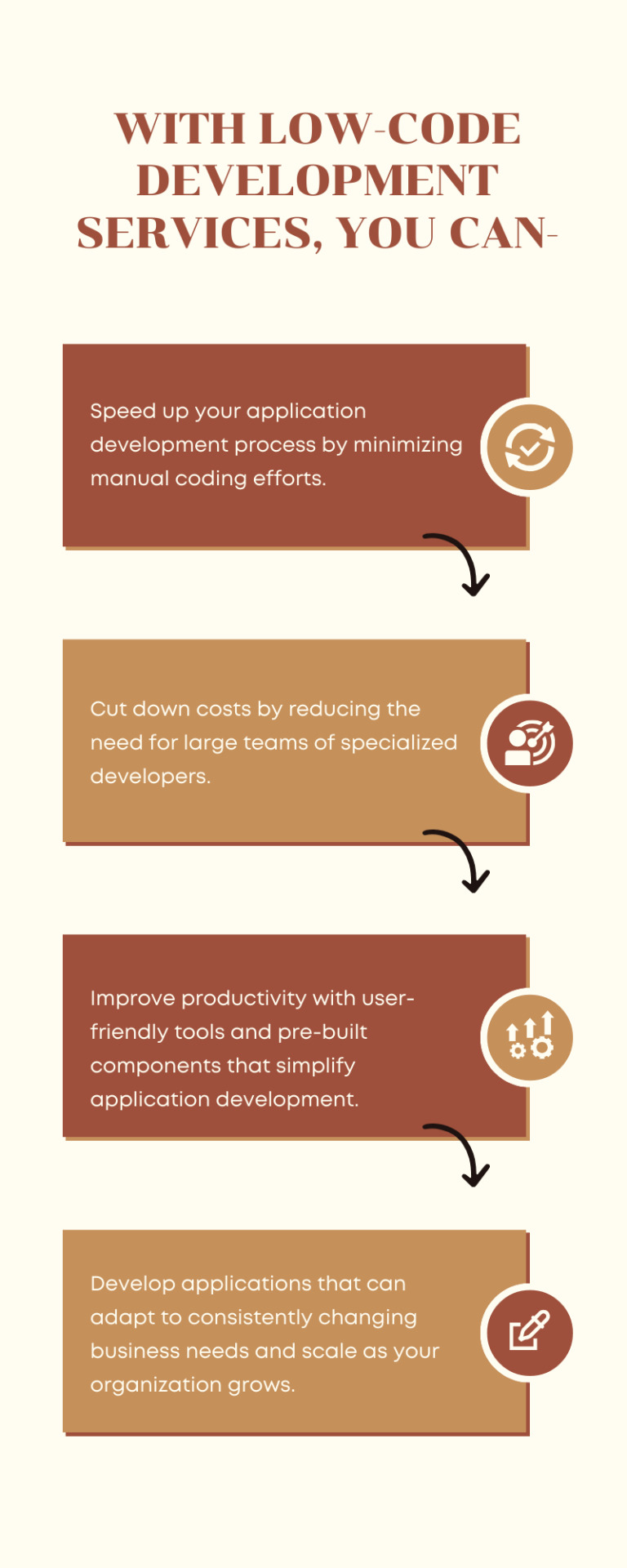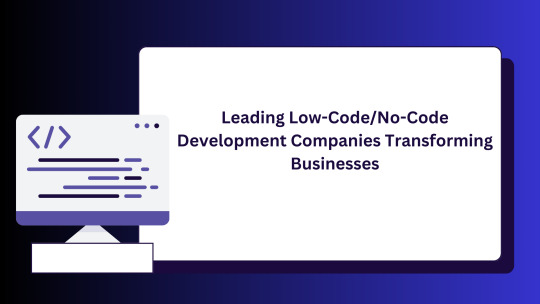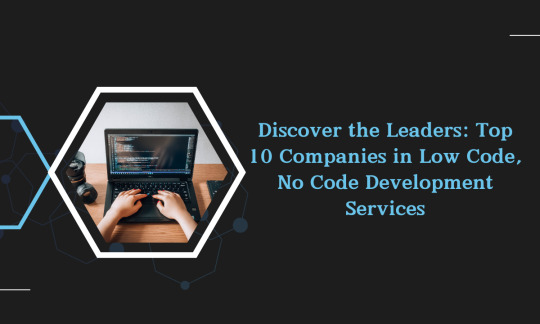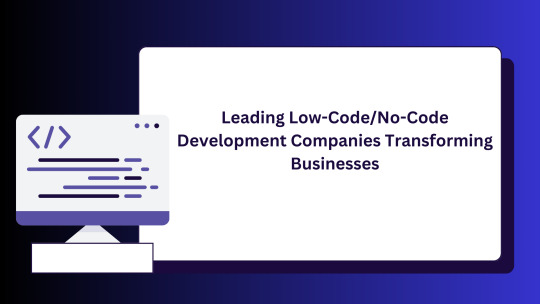#FutureOfDevelopment
Explore tagged Tumblr posts
Text
Looking for a future-proof, budget-friendly approach to development? Discover if low-code is the answer and leverage its cost-saving potential.
0 notes
Text
Streamline Your Application Development with Low-Code Development Services

Businesses can reduce costs, increase productivity and simplify the complexity of the entire process using low-code/no-code development services. Explore More: https://www.veetechnologies.com/services/it-services/software-testing-services.htm
0 notes
Text
Leading Low-Code/No-Code Development Companies Transforming Businesses

In today’s fast-paced digital world, businesses need efficient ways to develop applications quickly. Low-code and no-code platforms provide innovative solutions, enabling organizations to create applications with minimal coding. These platforms help streamline operations, enhance agility, and drive digital transformation. Below are the top 10 companies leading the way in Low-Code Application Development Services.
1. Vee Technologies
Vee Technologies offers tailored Low Code/No Code Development Services that improve productivity and streamline processes. Their solutions enable businesses to develop applications faster with minimal coding efforts. By leveraging these services, companies can reduce development costs and accelerate digital transformation. The expertise of Vee Technologies ensures rapid deployment, seamless integration, and enhanced scalability. Investing in Low Code/No Code Development Services empowers businesses to stay agile and competitive in a fast-evolving market.
2. Appian
Appian simplifies enterprise application development with its drag-and-drop components and automation features. Pricing starts at $75 per user/month, with a minimum charge for 100 users.
3. OutSystems
OutSystems accelerates development with its model-driven platform. It supports full-stack development and cross-platform functionality. Pricing starts at $1,513 per month, billed annually.
4. Salesforce Platform
Salesforce Platform integrates low-code capabilities with its CRM solutions, enabling businesses to build and automate workflows for enhanced customer experiences.
5. Microsoft Power Apps
Microsoft Power Apps allows businesses to create applications quickly while integrating seamlessly with Office 365, Azure, and Dynamics 365.
6. Zoho Creator
Zoho Creator is a user-friendly platform that allows businesses to design applications with a drag-and-drop interface, requiring little to no coding knowledge.
7. ServiceNow
ServiceNow’s App Engine Studio enables users of varying skill levels to collaborate and develop applications in a flexible, configurable environment.
8. Pegasystems
Pegasystems provides an enterprise-level low-code factory, allowing teams to develop and deploy applications with minimal technical expertise.
9. UiPath
UiPath specializes in automation and RPA, using its low-code platform to streamline administrative and operational processes.
10. Webflow
Webflow is a popular no-code tool for building responsive websites, enabling designers to create without needing programming skills.
Conclusion
These companies are revolutionizing Low-Code Development Services, helping businesses create applications faster and more efficiently. Adopting these platforms enhances agility, reduces development costs, and fosters collaboration between technical and non-technical users. Businesses that invest in these technologies gain a competitive edge in today’s digital landscape.
0 notes
Text
Discover the Leaders: Top 10 Companies in Low Code, No Code Development Services

In today’s fast-paced digital environment, low code and no code development services have emerged as essential tools for businesses looking to streamline application development and enhance operational efficiency. These platforms allow users to create applications with minimal coding, making it accessible for non-technical users and significantly speeding up the development process. Here’s a look at the top 10 companies providing these innovative services, with Vee Technologies leading the way.
1. Vee Technologies
Vee Technologies is a frontrunner in the low code, no code development services space, offering comprehensive solutions that empower businesses to create and manage applications efficiently. Their expertise in application management and support makes them one of the best application management companies, ensuring that clients receive ongoing assistance and optimization for their applications.
2. OutSystems
OutSystems is a well-established name in the low code development market. Their platform enables rapid application development with a focus on enterprise-grade solutions. OutSystems provides robust support and maintenance services, making them one of the best application management and support companies available.
3. Mendix
Mendix offers an intuitive low code platform designed for both developers and business users. Their emphasis on collaboration allows teams to work together effectively to build applications quickly. Mendix also provides excellent support services, reinforcing its position as a leader in application management.
4. Appian
Appian specializes in low code automation, allowing organizations to develop powerful applications that enhance operational efficiency. Their platform is known for its user-friendly interface and strong integration capabilities, making them a top choice for businesses seeking effective application management solutions.
5. Salesforce Lightning
Salesforce Lightning is part of the Salesforce ecosystem, providing low code tools that enable users to create custom applications quickly. With comprehensive support services, Salesforce stands out as one of the best application management companies, helping businesses maximize their CRM capabilities.
Conclusion
These companies represent the forefront of low code, no code development services, each offering unique strengths in application management and support. By leveraging these platforms, businesses can accelerate their digital transformation while ensuring they have the necessary support to maintain their applications effectively.
#TopLowCodeCompanies#NoCodeDevelopment#LowCodeSolutions#BestNoCodePlatforms#Top10TechCompanies#DigitalTransformation#NoCodeExperts#LowCodeRevolution#FutureOfDevelopment#TechInnovation
0 notes
Text
Global Solutions to Shape Our Future
In a world grappling with challenges like climate change, poverty, and inequality, global solutions for development are more crucial than ever. These strategies, which transcend borders and bring nations together, hold the promise of addressing universal problems effectively. The need for such solutions stems from the interconnected nature of today’s world, where progress—or the lack thereof—often has a ripple effect across nations.
What Are Global Solutions?
Global solutions refer to collaborative initiatives and strategies designed to tackle challenges that affect humanity as a whole. These solutions prioritize shared responsibility, leveraging the strengths of multiple nations to drive sustainable progress. For instance, agreements like the Paris Accord on climate change and global vaccination programs demonstrate the power of collective action.

Why Development Requires Global Collaboration
No single country can overcome the massive challenges of development alone. Issues like poverty, lack of education, and inadequate healthcare require resources, expertise, and cooperation that transcend borders. When countries collaborate, they share innovations, pool financial and technical resources, and build systems that benefit everyone. For example, joint efforts during the COVID-19 pandemic highlighted how global cooperation can save lives and economies.
Key Areas Addressed by Global Solutions
Global solutions impact various critical areas:
Climate Change: Agreements like COP aim to reduce carbon emissions globally.
Health: Initiatives such as the Global Fund combat diseases like AIDS, tuberculosis, and malaria.
Technology: Cross-border collaborations in AI and renewable energy promote equitable progress.
By addressing these areas, global solutions ensure a more sustainable future for all.
Challenges in Implementing Global Solutions
Despite their potential, implementing global solutions is no small feat. Political differences, cultural barriers, and funding gaps often delay or derail progress. For instance, geopolitical tensions can hinder meaningful agreements on issues like climate action. Similarly, unequal resource distribution and lack of accountability can lead to inefficiencies in execution.
Successful Examples of Global Solutions for Development
The success of initiatives like the eradication of smallpox through WHO efforts proves the effectiveness of global solutions. Another powerful example is the United Nations’ Sustainable Development Goals (SDGs), which have set a universal agenda to end poverty, protect the planet, and promote peace by 2030. These cases underline the potential of collective action in achieving monumental change.
The Role of Technology in Advancing Global Solutions
Technology plays a pivotal role in fostering global collaboration. Digital platforms, AI, and blockchain have accelerated communication, resource sharing, and transparency in initiatives worldwide. For example, AI-powered solutions help predict and mitigate climate-related disasters, while blockchain ensures accountability in global funding efforts.
How Individuals and Businesses Can Contribute
Global solutions begin with local actions. Individuals can contribute through sustainable practices, volunteering, and advocacy. Meanwhile, businesses can engage in corporate social responsibility (CSR) initiatives, support international partnerships, and innovate for sustainable development. These efforts, no matter how small, amplify the impact of global strategies.
The Future of Global Solutions for Development
The future of global solutions is promising, driven by innovation and inclusivity. Trends like green technologies, equitable trade policies, and education reforms will continue to shape the development landscape. However, sustained commitment and adaptability are essential for long-term success.
Conclusion: Building a Unified Path Forward
Global solutions for development are not just an option—they are a necessity for creating a sustainable and equitable world. By working together, leveraging technology, and fostering inclusivity, humanity can overcome its greatest challenges. Now more than ever, it is our collective responsibility to build a unified path forward for future generations.
0 notes
Text
Could No-Code Platforms Like Build AI Make Developers Obsolete?

Imagine a future where no-code platforms like Build AI are so advanced that anyone can create sophisticated AI applications without needing to write code. Could this mean that developers are no longer needed, or is there still a critical role for coding experts in the AI landscape?
Scenario: Consider a future where businesses and individuals rely entirely on no-code platforms like Build AI to create AI-powered solutions. Anyone can build applications for customer service, predictive analytics, or automation without writing a single line of code. This democratization of AI development could lead to a surge in innovation, as more people bring their ideas to life.
Analysis:
Potential Benefits:
Wider Accessibility: No-code platforms make AI development accessible to everyone, enabling businesses without technical expertise to leverage AI solutions.
Rapid Innovation: The ability to create AI solutions quickly could lead to a surge in new applications, products, and services across industries.
Challenges:
Complex Customization: While no-code platforms are powerful, they may not be suitable for highly complex or unique use cases. Developers bring specialized skills that allow for advanced customization and optimization.
Scalability and Integration: As businesses grow, their AI needs may become more complex. Developers are needed to build scalable solutions, manage integrations, and ensure that the technology meets enterprise-level requirements.
Do you think no-code platforms like Build AI could make developers obsolete, or is there still a need for coding expertise in building complex AI solutions? Would you trust a no-code AI solution for all your business needs? Share your thoughts!
Join the discussion on the future of AI development. Could no-code platforms replace developers, or will coding skills always be essential? Share your views and explore more at aiwikiweb.com/product/build-ai/
#NoCode#BuildAI#FutureOfDevelopment#AIApplications#NoCodePlatform#HumanVsAI#TechDiscussion#BusinessInnovation#DigitalTransformation#AIForEveryone
0 notes
Text
Explore the future of development with a career as a Full Stack Developer. Learn essential skills, key steps, and why this versatile role is crucial for the tech industry's growth. Discover how to build a successful career in Full Stack Development.
#FullStackDeveloper#TechCareer#SoftwareDevelopment#WebDevelopment#FrontEnd#BackEnd#Coding#Programming#TechJobs#FutureOfDevelopment#CareerAdvice#DeveloperSkills#TechIndustry
0 notes
Text






10 Best Low-Code Development Platforms In 2023 In 2023, the top 10 low-code development platforms are revolutionizing software with user-friendly interfaces and rapid app development, driving digital transformation. Appian, OutSystems, Mendix, Microsoft Power Apps, Salesforce Lightning, and others empower businesses with diverse features and easy integration, making app development accessible to all. . . ➡️Check out the post to learn more about them. ➡️Let us know if you want to know more points in the comment section below 👉Do not forget to share with someone whom it is needed. 👉Let us know your opinion in the comment down below 👉Follow @Zoof Software Solutions for more information ➡Grow your business with us! . . ✔️Feel free to ask any query at [email protected] ✔️For more detail visit: https://zoof.co.in/
#LowCodeDevelopment#LowCode2023#LowCodeAppDevelopment#LowCodePlatforms#developmentplatform#coding#ProductivityTools#DigitalTransformation#FutureOfDevelopment#SoftwareDevelopment#AppDevelopment2023#technology#automation#javascript#TechInnovation#LowCodeRevolution#development#SoftwareCompany#StartUpTechnology#mobilefriendlywebsite#GrowBusiness#WebsiteDevelopment#SoftwareConsultant#ZoofSoftwareSolutions#zoof#zoofinc#MobileAppDevelopment#AwardWinningCompany#BestSoftwareCompany#digitalmarketing
0 notes
Link
0 notes
Text

Ready to dive into the world of web development? Learn React with TechAircraft and unlock the power of building dynamic, high-performance user interfaces. React is one of the most popular JavaScript libraries for creating seamless, interactive web applications, and with our expert-led training, you'll master the skills needed to build scalable and efficient solutions. Whether you're a beginner or looking to enhance your skills, our hands-on courses and real-world projects will guide you every step of the way. Get started today and open the doors to endless career opportunities in tech with React, backed by TechAircraft's expert support and resources!
LearnReact #TechAircraft #WebDevelopment #JavaScript #ReactJS #FrontendDevelopment #ReactTraining #TechEducation #CodingSkills #WebDesign #ReactCourse #TechCareer #Programming #ReactDevelopment #LearnToCode #DeveloperJourney #TechTraining #BuildWithReact #TechSkills #FutureOfDevelopment
0 notes
Text
Serverless apps – are they the future of development?
0 notes
Text
Leading Low-Code/No-Code Development Companies Transforming Businesses

In today’s fast-paced digital world, businesses need efficient ways to develop applications quickly. Low-code and no-code platforms provide innovative solutions, enabling organizations to create applications with minimal coding. These platforms help streamline operations, enhance agility, and drive digital transformation. Below are the top 10 companies leading the way in Low-Code Application Development Services.
1. Vee Technologies
Vee Technologies offers tailored Low Code/No Code Development Services that improve productivity and streamline processes. Their solutions enable businesses to develop applications faster with minimal coding efforts. By leveraging these services, companies can reduce development costs and accelerate digital transformation. The expertise of Vee Technologies ensures rapid deployment, seamless integration, and enhanced scalability. Investing in Low Code/No Code Development Services empowers businesses to stay agile and competitive in a fast-evolving market.
2. Appian
Appian simplifies enterprise application development with its drag-and-drop components and automation features. Pricing starts at $75 per user/month, with a minimum charge for 100 users.
3. OutSystems
OutSystems accelerates development with its model-driven platform. It supports full-stack development and cross-platform functionality. Pricing starts at $1,513 per month, billed annually.
4. Salesforce Platform
Salesforce Platform integrates low-code capabilities with its CRM solutions, enabling businesses to build and automate workflows for enhanced customer experiences.
5. Microsoft Power Apps
Microsoft Power Apps allows businesses to create applications quickly while integrating seamlessly with Office 365, Azure, and Dynamics 365.
6. Zoho Creator
Zoho Creator is a user-friendly platform that allows businesses to design applications with a drag-and-drop interface, requiring little to no coding knowledge.
7. ServiceNow
ServiceNow’s App Engine Studio enables users of varying skill levels to collaborate and develop applications in a flexible, configurable environment.
8. Pegasystems
Pegasystems provides an enterprise-level low-code factory, allowing teams to develop and deploy applications with minimal technical expertise.
9. UiPath
UiPath specializes in automation and RPA, using its low-code platform to streamline administrative and operational processes.
10. Webflow
Webflow is a popular no-code tool for building responsive websites, enabling designers to create without needing programming skills.
Conclusion
These companies are revolutionizing Low-Code Development Services, helping businesses create applications faster and more efficiently. Adopting these platforms enhances agility, reduces development costs, and fosters collaboration between technical and non-technical users. Businesses that invest in these technologies gain a competitive edge in today’s digital landscape.
#LowCodeNoCode#NoCodeDevelopment#LowCodeSolutions#NoCodeRevolution#FutureOfDevelopment#DigitalTransformation
0 notes
Text
Tweeted
Join our new series on the #FutureOfDevelopment, with leading development thinkers. #NobelPrize Laureate and Economist, Amartya Sen is our 1st guest! in conversation with @UNDP Administrator @ASteiner RSVP for 12 November at 12PM EST https://t.co/Eqfw2C7C7u
— Gulden T Cosslett (@GuldenTC) November 9, 2020
0 notes